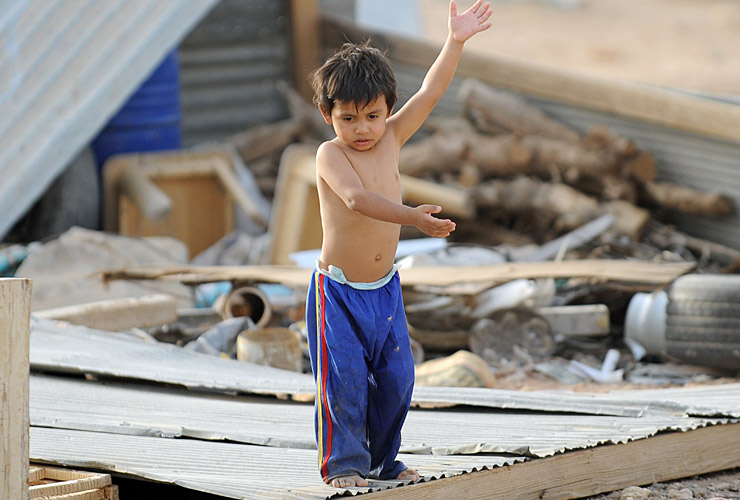UN vows to end scourge of statelessness
Ten million people have no nationality, limiting access to education, medical care and travel

A free daily email with the biggest news stories of the day – and the best features from TheWeek.com
You are now subscribed
Your newsletter sign-up was successful
The United Nations has launched a global campaign which aims to end the plight of statelessness within ten years.
People born without nationality are often deprived of education and medical care, and they may not be allowed to travel.
In some cases citizenship may be denied to specific ethnic groups within a country, the BBC reports, and in other cases people may slip between bureaucratic cracks.
The Week
Escape your echo chamber. Get the facts behind the news, plus analysis from multiple perspectives.

Sign up for The Week's Free Newsletters
From our morning news briefing to a weekly Good News Newsletter, get the best of The Week delivered directly to your inbox.
From our morning news briefing to a weekly Good News Newsletter, get the best of The Week delivered directly to your inbox.
"Children born in refugee camps often have no entitlement to the nationality of the new country they are born in," it says, "and no chance of returning to the country of their parents to claim nationality there."
The United Nations High Commission for Refugees is marking the 60th anniversary of the 1954 Convention Relating to the Status of Stateless Persons with a series of events designed to "highlight the human face of statelessness" and persuade countries to grant nationality to all their stateless people.
What is the 1954 Convention?
This was the UN's first attempt at solving the problem of statelessness. It is a list of recommendations first prepared by the UN Economic and Social Council after the Second World War, and according to a report published by the UNHCR in 2003, it remains "the primary international instrument adopted to date to regulate and improve the legal status of stateless persons and to ensure to them fundamental rights and freedoms without discrimination".
A free daily email with the biggest news stories of the day – and the best features from TheWeek.com
What will the UNHCR do to end statelessness now?
The UNHCR said it will establish a "series of dialogues with stateless people to better understand the impact of statelessness" and then "bring together policymakers, international organizations, NGOs and academics to discuss new research and policy perspectives to tackle some of the most pressing statelessness situations around the world".
The BBC reports that refugees' rights groups say that too little progress has been made on the issue.
-
 The week’s best photos
The week’s best photosIn Pictures An explosive meal, a carnival of joy, and more
-
 The ‘ravenous’ demand for Cornish minerals
The ‘ravenous’ demand for Cornish mineralsUnder the Radar Growing need for critical minerals to power tech has intensified ‘appetite’ for lithium, which could be a ‘huge boon’ for local economy
-
 Why are election experts taking Trump’s midterm threats seriously?
Why are election experts taking Trump’s midterm threats seriously?IN THE SPOTLIGHT As the president muses about polling place deployments and a centralized electoral system aimed at one-party control, lawmakers are taking this administration at its word
-
 Epstein files topple law CEO, roil UK government
Epstein files topple law CEO, roil UK governmentSpeed Read Peter Mandelson, Britain’s former ambassador to the US, is caught up in the scandal
-
 Iran and US prepare to meet after skirmishes
Iran and US prepare to meet after skirmishesSpeed Read The incident comes amid heightened tensions in the Middle East
-
 Israel retrieves final hostage’s body from Gaza
Israel retrieves final hostage’s body from GazaSpeed Read The 24-year-old police officer was killed during the initial Hamas attack
-
 China’s Xi targets top general in growing purge
China’s Xi targets top general in growing purgeSpeed Read Zhang Youxia is being investigated over ‘grave violations’ of the law
-
 Panama and Canada are negotiating over a crucial copper mine
Panama and Canada are negotiating over a crucial copper mineIn the Spotlight Panama is set to make a final decision on the mine this summer
-
 Why Greenland’s natural resources are nearly impossible to mine
Why Greenland’s natural resources are nearly impossible to mineThe Explainer The country’s natural landscape makes the task extremely difficult
-
 Iran cuts internet as protests escalate
Iran cuts internet as protests escalateSpeed Reada Government buildings across the country have been set on fire
-
 US nabs ‘shadow’ tanker claimed by Russia
US nabs ‘shadow’ tanker claimed by RussiaSpeed Read The ship was one of two vessels seized by the US military